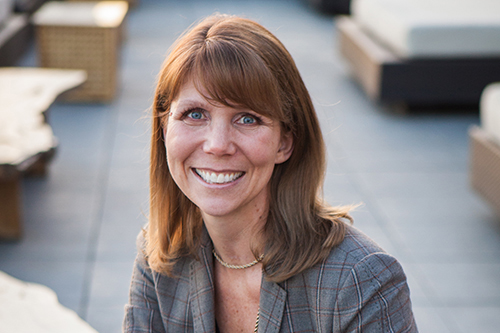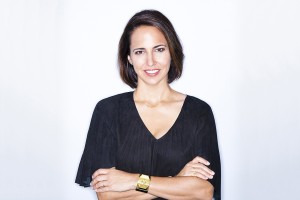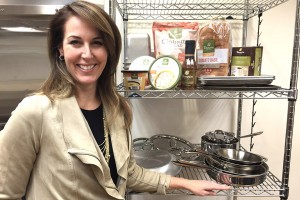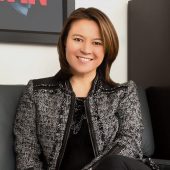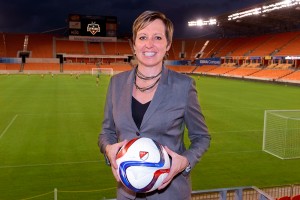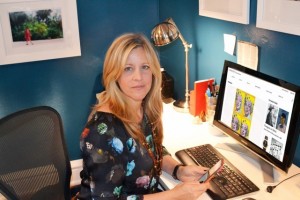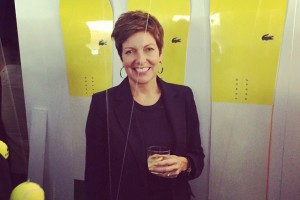Christine Heckart, CMO at San Jose-based Brocade, Microsoft Alum, and Colorado Native
Christine Heckart has a job in a field – high tech – that, when hearing the minutiae of its components, you either immediately get, or you don’t. But whether the phrases “software-driven innovation platforms” and “ethernet fabrics” are recognizable to you, their dynamic, digital ring denotes the wave of the present, and, very obviously, the future. And to that end her employer, Brocade, based in the very hub of Silicon Valley, San Jose, provides hardware, software, and cloud-based business solutions. Heckart came to the job after working for the needs-no-introduction Microsoft, as well as NetApp, and is now Brocade’s Chief Marketing Officer and Senior Vice President of Ecosystems. She is also on the Board of Directors of Lam Research, a supplier to the semiconductor industry.
She comes across as a straight-talker – she notes below that she has “a strong personality” — but for someone who has been listed by businesswire.com as one of 2015’s Top 50 Powerful Women in Technology, that’s probably been a career asset. She also has a great Twitter feed whose subjects encompass everything from Cisco router problems and NFL wins to amusing comments about waiting at the DMV, and loyal-employee props to Brocade about the most recent innovations in its NewIP initiative.
She is a Colorado native, a wife and mother, another big fan of Shakeology (the career woman’s protein-packed, lower-cholesterol-and-blood-sugar wonder drink), and a writer of science fiction. She is also a big believer in being original and inventive, as seen in her list of interview questions – which, it goes without saying, is a great quality if you work for one of the most cutting-edge industries on the planet.
Can you tell the readers a little bit about yourself?
I’ve been in technology for twenty-seven years—in either marketing or general management. I’ve seen the tech industry from every vantage point. And I’m a mother of three who loves to write and paint!
What does a day in your shoes typically look like?
A lot of meetings. My focus is on strategy, so 80% of my time gets spent on strategic decisions – i.e. the “what should we be doing?” part. The remaining 20% of my time is making sure the execution on those decisions is happening, and doing course corrections if needed.
What is your breakfast of choice?
Shakeology. Every morning.
What are your rituals or tips for staying energized and motivated?
I am very lucky that a good night’s sleep can re-energize me. I don’t really need something throughout the day to help me get energized.
What is the favorite part of your job?
I love every part of my job.
What and who inspires you at work?
I’m inspired by all of the people who are doing super-innovative, creative fun things anywhere in the business. I get to see more of it in marketing than anywhere else. When people show up with a creative idea to solve a problem or create a new opportunity, that’s awesome!
Do you have a “Power Outfit” that you wear for a big meeting or important work event?
I don’t have one “Power Outfit,” but I tend to wear a lot of color. My biggest problem when preparing for an important event is usually: how do I tone down, not tone up! I think about packaging for the audience, for the event, because the outward package does send a signal, so you have to be careful. Today was a good day to demonstrate that (I was wearing a textured, neon-pink dress!).
What is your favorite leisure activity after a stressful work week?
Right now, mostly creative writing.
How does your culture/background influence your work?
The networking industry is in a time of inflection; it’s at a turning point. I have tended to hop to inflection points in the tech industry—tech being my most relevant cultural background—throughout my career. Because I’ve seen the same industry from a lot of vantage points, there are certain things I have good instinct for in advance of having good data (in times of inflection, there isn’t always much data available on new trends, ideas). That instinct allows me to operate in times of high change with high confidence.
How many times have you changed your career direction?
I’ve always been in tech, so no big change in career direction. But if you wanted to count each of the facets as a change in direction, I’ve looked at the tech industry from all vantage points: service provider, vendor, storage, consultant, hardware, software, entertainment, services, and networking. I’ve been a part of different areas of tech, but they’ve all been a part of my general career direction.
What has been your biggest obstacle in your career and how did you overcome it?
I have a very strong personality, and I’m rarely intimidated by titles. That can be construed as arrogance, or as being headstrong. I don’t know if I’ve overcome it, but I’ve definitely tried to become better at listening and understanding better other points of view.
What are your most steadfast ‘don’ts’ rules regarding work and the workplace, and what are your most cherished ‘do’s’?
Do’s:
-
-
- Think big, start small, move fast.
- Make everything fun, simple and approachable.
-
Don’ts:
-
-
- Don’t be boring.
- Don’t be the same as everyone else — that’s really the opposite of all my do’s!
- Don’t worry about trying something new or taking a risk—really, don’t worry about the risk side of things.
-
I don’t spend a lot of time on don’ts — traditional don’ts can get in the way.
What are the most important qualities of a good leader?
The best leaders I have personally worked for, who I thought were great, had the quality of being a visionary, while being approachable and flexible.
What are the unforgettable traits of role models who have inspired you most?
The people who inspire me the most are my kids and my husband. Or there are people I’ve worked with who have traits like a sense of humor. I’m also inspired by people who have a lot of perseverance, and those who think differently about a problem.
How have mentors impacted your personal and professional development?
I’ve never had any formal mentors, but a lot of informal ones who have been peers or people who’ve worked for me. But I‘ve had a lot of help career-wise with sponsors. I’ve also had a lot of leaders — male leaders — willing to sponsor me by putting me in a big role. Sponsors have put me in the jobs I wanted, and mentors have helped me through.
What are three questions you like to ask during an interview to know if the candidate (or job) is the right fit?
I interview for vision, courage, and creativity. So I ask questions like the following:
-
-
- “Give me the most innovative idea you’ve ever had, even if you weren’t able to implement it.”
- “Give me an example of the most unconventional program or product you’ve developed.”
- “Give me an example of where you’ve had an unusual impact on a person or organization.”
-
What advice would you give to women starting their careers?
-
-
- Pick an industry with growth—it doesn’t have to be friendly to women necessarily, just as long as it has growth.
- Marry the right person—if you marry the wrong person, and they’re not supportive of your career, you won’t be successful.
- Have courage and confidence.
-
What book would you recommend for women just starting their career?
There are a lot of good books out there, so it’s hard to pick just one that I’d recommend.
What is your favorite quote you try and live by?
I have favorite quotes, but not one I try and live by. Some people live and think by quotes, but I don’t.
TAGS: SharpSavvySignificant
 Interviewer Interview Prep
Interviewer Interview Prep Impactful Mentees
Impactful Mentees Benefits of a Mentor
Benefits of a Mentor Advice for First-Time Managers
Advice for First-Time Managers Overcoming the 18-month Itch
Overcoming the 18-month Itch Dressing for Your Style
Dressing for Your Style Interview Style Tips
Interview Style Tips Women's Stocking Stuffers
Women's Stocking Stuffers Gift the Busy Traveler
Gift the Busy Traveler Father’s Day Gift Guide
Father’s Day Gift Guide Airport Layover Activities
Airport Layover Activities Traveling & Eating Healthy
Traveling & Eating Healthy Travel Like a Boss Lady
Travel Like a Boss Lady The Dual California Life
The Dual California Life Gifts for Thanksgiving
Gifts for Thanksgiving Summer Reading List
Summer Reading List Top Leisurely Reads
Top Leisurely Reads New Year, New Books
New Year, New Books Life Lessons from a Sitcom
Life Lessons from a Sitcom Oprah, Amy or Amal?
Oprah, Amy or Amal?





